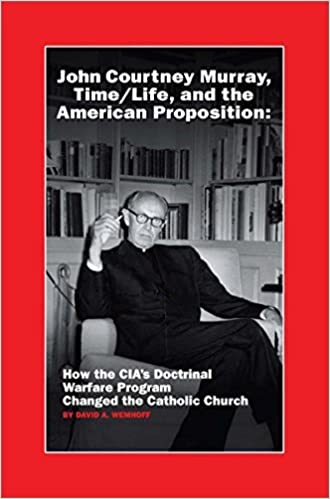https://thedukereport.com/books/john-courtney-murray-time-life-and-the-american-proposition-two-volumes/
John Courtney Murray, Time/Life, and the American Proposition (Two Volumes)

"David A. Wemhoff has devoted 990 pages of meticulous and pains-taking research to illustrate his proposition that America sought to recruit the world's religions as part of a strategy to disseminate American ideology around the world during the Cold War. His focus is on the Roman Catholic Church, which not only had a global presence, but one accessible leader who shared with the United States a mutual antipathy toward Communism and the Soviet Union. Key to this process was the publisher Henry Luce..... Wemhoff points to the curious fact that despite Murray's undoubted significance there has yet to appear a biography. Wemhoff speculates that there is a reluctance to address a 'dangerous' topic that would expose Murray's connections with American intelligence and his support for the efforts of the American establishment 'to conquer the Church'. (p 894) Perhaps. But now that Wemhoff has raised so many contentious issues and identified such a wealth of archival sources replete with intriguing correspondence, it seems highly likely that enterprising scholars will pay far more attention to Murray and, indeed, to church-state relations more generally....At the same time, his research is an important contribution to that of a cohort of scholars addressing the religious component in America's Cold War, divided by whether it reflected American ambition and interests or American goodness and morality. Wemhoff's work certainly reinforces the arguments of the former."----Dr. Dianne Kirby, Reader of History, University of Ulster, Northern Ireland
"Mr. Wemhoff plunges us into his account of Americanism and its ravages during the Second World War and the post war era: precisely when the national cult had reached its full maturity, became conscious of possessing the means to bend the rest of the world to its teaching, and demonstrated the will to do so. Hence, he introduces us not just to the underlying, seductive claim of the Moderate Enlightenment to be the practical defender of religious as well as other freedoms---something that might have seemed more plausible as the American system was still in the process of development. He also, simultaneously, shows the reality to which this "last and best hope of mankind"---as Lincoln called it--- logically leads, at the dramatic historical moment when the materialist oligarchy that had always understood the value of the American system for maintaining its power came "out of the closet" and displayed its eagerness to work together with governmental agencies gone rogue to confirm its domination and extend it globally." - Dr. John C. Rao, Professor of history at St. John's University, director of the Roman Forum/Dietrich von Hildebrand Institute. --This text refers to the paperback edition.

Comments